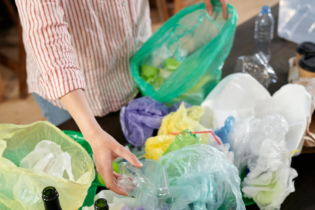Due to rapid population growth and urbanisation, South Africa generates significantly more waste per capita than it did a few decades ago. As a result, our landfills are put under considerable pressure resulting in increased levels of waste in the environment.
The recently implemented Extended Producer Responsibility (EPR) regulations therefore serves as a critical catalyst in holding producers accountable for waste management and recycling. EPR is not a new concept and has been practised in Europe for many decades, but it is gaining considerable traction in South Africa, according to Shabeer Jhetam, CEO of The Glass Recycling Company (TGRC), the sole Producer Responsibility Organisation (PRO) for glass packaging in South Africa. TGRC is registered with the Department of Forestry, Fisheries, and the Environment (DFFE) as a Producer Responsibility Organization (PRO) in terms of the Extended Producer Responsibility Regulations. All producers of glass and glass packaging, as per the EPR regulations, are encouraged to join an existing PRO for cradle to cradle of all glass packaging in relation to the EPR scheme. In May 2021, EPR came into effect in South Africa and the obliged industries were paper and packaging, electronic good and lighting. As a result of this, producers must adhere to a set of stringent targets and objectives. TGRC’s membership grew from 18 to 90 producers in need of an EPR scheme to facilitate their EPR obligations for glass packaging. Industries that are members of TGRC are from the food and beverage, pharmaceutical, cosmetics and glass manufacturing industries. Undoubtedly, more consumer education will enhance consumer awareness of packaging’s effects on the environment, thereby making eco-focused brands more competitive across these sectors. All glass packaging can be reused multiple times without losing its purity, value or quality, closing the loop on a complete circular economy.“We take our responsibilities and goals towards the environment very seriously at TGRC, and we strive to create a sustainable supply chain. By facilitating the collection of glass for recycling, we not only reduce landfill burdens, but also reduce carbon emissions,” says Jhetam.
“There are numerous producers who place glass packaging on the market but have not become members for TGRC. We appeal to these producers to comply with EPR legislation by registering with TGRC. Non-compliance of the EPR regulation can result in a producer being fined, imprisoned for a maximum of 15 years or a combination of both,” adds Jhetam. TGRC recognizes the importance of all the partners in the glass collection value chain. This broad range covers the hospitality sector, schools, glass collectors, waste pickers and entrepreneurs. We support them with various receptacles such as skip bins, wheelie bins, drums, scales and consumables including bulk bags and personal protective equipment. These initiatives support further entrepreneurship driving growth and success of these small businesses. Educating entrepreneurs, glass collectors, waste pickers about glass recycling is also at the core of our EPR scheme. In relation to this, we facilitate informal and formal training sessions that are offered to entrepreneurs across the country working closely with all waste picker associations to integrate the waste collectors, reclaimers into the collection value chain. “Our collaboration with municipalities across the country in relation to separation at source projects (s@s) will significantly contribute to increasing the recovery of glass,” explains Jhetam. TGRC has placed in excess of 4 000 glass banks across the country to enable consumers to recycle their glass packaging. These glass banks are routinely maintained and serviced by SMMEs, allowing these businesses to expand their recycling efforts and spread awareness of the advantages of recycling. The most recent glass collection percentage in South Africa is 44.2% according to TGRC.






